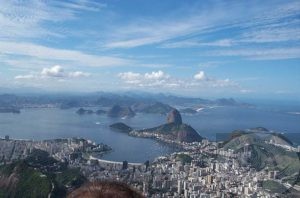
Rio de Janeiro, Brazil
Rio is more than just beaches
…although they’re great too
I spent several days in Rio, and once I got acclimatized to the city itself and its vibes and undercurrents, I felt more at ease. Yes, I became more aware of my surroundings, and I would make sure the gate to my apartment building was securely locked behind me, but I also started to enjoy the city and its attractions more, and ventured out to different areas. Despite the language difference, I was communicating through a mixture of bad Spanish and the odd word of Portuguese and a lot of grammatically incorrect English, but making it all work.
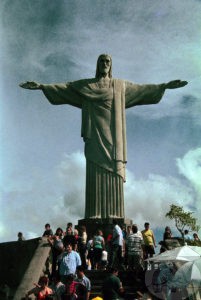
Christ the Redeemer, constructed between 1922 – 1931, the statue is 30 meters high, and the arms stretch 28 meters.
I had been in Rio before, and at that time had gone up to the famous 30-metre statue of Christ the Redeemer or Cristo Redentor that overlooks the sprawling city below. Completed in 1931, the statue is truly an amazing place, and has been named as one of the new ‘7 wonders of the world’; I certainly recommend it for any visitors, and what’s more, you get a magnificent view of Copacabana and Ipanema beaches. Although there are several ways to reach the top of the mountain and the statue, taking the tram is the most scenic way, and well worth the trip. The tram takes you up to the platform just below the statue, and it is only a short climb up to the feet, and the place where everyone takes a selfie (so don’t expect to get a picture with only you in the frame and no other visitors, it’s a near guaranteed impossibility). A second visit would have been worthwhile, but I wanted more to see other sights while I had the opportunity. Going to Sugarloaf mountain was on my list as well, although it had been moved down the list quite a bit after having worked on a film that used Sugarloaf mountain and its mountain-top cafe as a setting (totally recreated to scale in a studio in Bangkok, Thailand) – I was afraid the actual location would either be a let-down or I would be made aware of how inadequate the set had been; either way, the visit would have to come at some other time. And so it was that I went on foot to explore the old city areas of Rio.
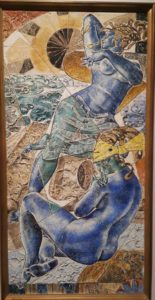
Art inspired by the titans of Greek mythology,
Galleries, Churches, Culture
In an area called Cinelandia, visitors can find a wide variety of attractions, and although I have seen half-day walking tours advertised that will show you ‘everything’, from personal experience it is best to spend a day in the area, as the walking tours seem designed to only show the exteriors of buildings with a quick visit to the principal theatre followed by a coffee to round off the tour. I say at least one day, depending on what you would like to see or do. There are several museums and art galleries in the district, a few churches, as well as the national library and national theatre. When I had first arrived in Rio and was using a local bus to get from the airport to my accommodation, I had crossed this area and had already caught glimpses of the wonderful architecture and the bustling streets. Arriving here on the day of my walking tour, the streets were teeming with people, and the small squares and some of the narrower alleys were filled with little booths and tents and carts selling whatever one might imagine, particularly around the Cinelandia station area. I alighted at Candelaria, and explored this area, first passing by the Igreja de Nossa Senhora de Candelaria, a beautiful little church with a marble exterior. I should have taken a few moments to enter the church, but opted to head for the two art galleries nearby instead.
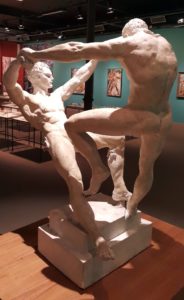
Floating in space, sculpture by Flora de Morgan-Snell
Coins and paper money from around the world
Only a few short steps away stands the Centro Cultural Banco do Brasil (CCBB Rio de Janeiro) or the Bank of Brazil Cultural Centre. This neoclassic building completed in 1906 is managed by the Bank of Brazil, and contains theatre space, a comfortable coffee shop, and several floors dedicated to different art exhibitions. The top two floors may be of interest to numismatists, as the facility has a huge collection of coins and bank notes from nearly all the countries of the world. When I visited, the facility was hosting a large exhibition on early 20th Century “De Stijl” movement revised by Dutch artist Piet Mondrian. As the blurb from the exhibition reads:
“Panorama” features paintings, architectural drawings, models, furniture, documentaries, period publications and photographs of artists of the movement of modern Dutch forefront “De Stijl”, started as revised in 1917 and had as icon painter Piet Mondrian.
These artists drew up a kind of “total art”, using primary colors to create works without restrictions, clear and clean, as they imagined the future. The exhibition also shows the Mondrian path of figuration to abstraction.”
The exhibitions change regularly, and there is always something new to be discovered at the CCBB.
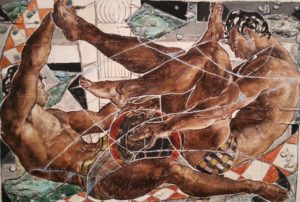
The heroes of Greek epics
Naked beings floating in space
Similarly, only a few steps away is the Centro Cultural dos Correios or Post Office Cultural Centre. This space, although smaller than that of the bank, also offers some wonderful exhibitions, and a ride in the elevator is a must. While I was visiting, there was an interesting exhibition of works by Ferdinand Pettrich an internationally famous portrait sculptor, while another large exhibition consisted of some very interesting works by Flora de Morgan-Snell, a self-taught artist whose works are influenced by ancient epics such as Homer’s Odyssey, John Milton’s Paradise Lost and Dante Alighieri’s “Hell” from his Divine Comedy. The works of Morgan-Snell portray the mythological beings and titans as free from the law of gravity; her representation of these figures, the beauty of the human body, and this freedom make the characters appear as though floating in space. Of all the many beautiful exhibitions I have seen, this particular exhibition, and these works of art are among my most favourite works, and I leave you here with a few pictures of these works.

Paintings by Morgan-Snell
